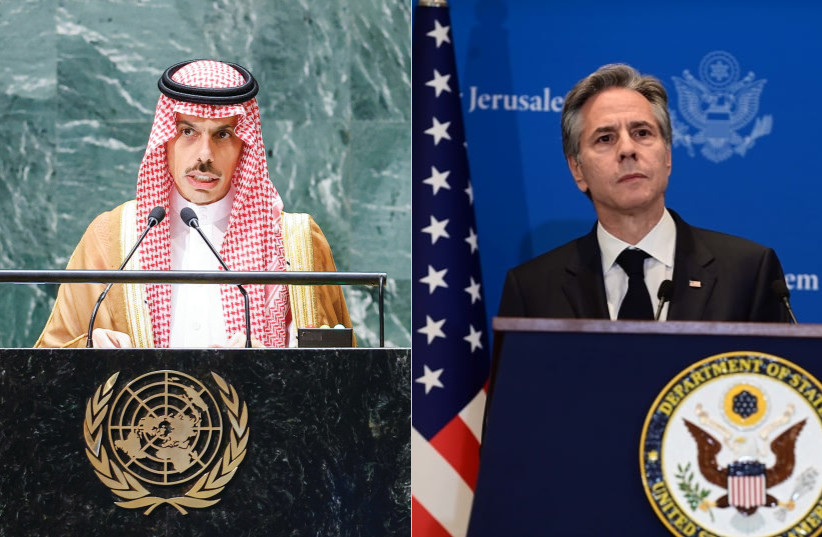In an unusual move, the Saudi Foreign Ministry late Tuesday night clarified that Israel must recognize a Palestinian state at the pre-1967 lines to normalize ties with Saudi Arabia.
The statement appeared to douse US President Joe Biden’s hope for a trilateral deal between Washington, Riyadh, and Jerusalem this year.
“The Kingdom has communicated its firm position to the US administration that there will be no diplomatic relations with Israel unless an independent Palestinian state is recognized on the 1967 border, with east Jerusalem as its capital,” the Saudi Foreign Ministry said.
“The Kingdom reiterates its call to the permanent members of the UN Security Council that have not yet recognized the Palestinian state to expedite the recognition of the Palestinian state on the 1967 borders, with east Jerusalem as its capital, so that the Palestinian people can obtain their legitimate rights and so that a comprehensive and just peace is achieved for all,” it added.
The Foreign Ministry issued its statement after US Secretary of State Antony Blinken visited Saudi Arabia on Monday and met with Crown Prince Mohammed bin Salman Al Saud in Riyadh.

It was the first leg of Blinken’s whirlwind Middle East tour, the fifth he has made since the start of the Israel-Hamas war. The visit, which includes stops in Egypt and Qatar, is billed as one that will advance a Saudi-Israel normalization deal and an agreement with Hamas for the release of more than 130 hostages held in Gaza.
At a press briefing in Doha on Tuesday night, before he arrived in Israel on Wednesday, Blinken spoke optimistically about the possibility of a Saudi-Israel normalization deal.
“With regard specifically to normalization, the crown prince reiterated Saudi Arabia’s strong interest in pursuing that,” he said. “But he also made clear what he had said to me before, which is that to do that, two things are required: an end to the conflict in Gaza; and a clear, credible, time-bound path to the establishment of a Palestinian state.”
“But he also made clear what he had said to me before, which is that in order to do that two things are required: an end to the conflict in Gaza and a clear, credible, time-bound path to the establishment of a Palestinian state.”
In a teleconference with reporters on Tuesday, US National Security Council spokesman John Kirby said: “We were, before the 7th of October, and are still now having discussions with our counterparts in the region, Israel and Saudi Arabia – obviously, the two key ones – about trying to move forward with a normalization arrangement between Israel and Saudi Arabia.”
The Saudi-Israel normalization push was separate from the diplomacy around the Gaza war regarding a hostage deal and a pause to the war, he said.
The track toward a Saudi-Israel deal “is a separate track and not related specifically to trying to get this extended humanitarian pause in place,” Kirby said. “Both are important, though.”
Israel's willingness to make peace not enough for Saudis
The US had hoped that an Israeli willingness to engage in a peace process between two states would be enough to allow the issue to move forward.
Within hours, Saudi Arabia released a sharp statement in the middle of the night and clarified that this was not the case.
It also linked a normalization process to the Gaza war. To achieve a normalization deal, “Israel’s aggression on the Gaza Strip stops, and all Israeli occupation forces withdraw from the Gaza Strip,” the statement said.
Israel has insisted that it will only stop the war once it has destroyed Hamas, and that once the conflict is over, the IDF must retain security control of the enclave.
Prime Minister Benjamin Netanyahu and his government also have been clear about their opposition to a Palestinian state.
PLO Executive Committee Secretary-General Hussein Al-Sheikh said: “We thank the Kingdom of Saudi Arabia for its firm stance and the efforts made to stand with the Palestinian people and their just cause.”
